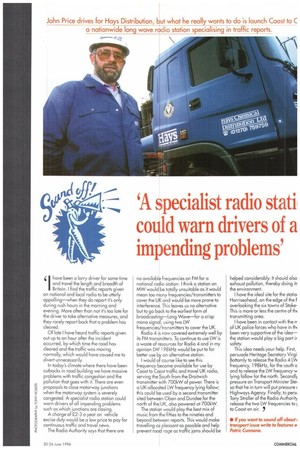'A specialist radio stati could warn drivers of a impending problems'
Page 51

If you've noticed an error in this article please click here to report it so we can fix it.
6 I
have been a lorry driver for some time and travel the length and breadth of Britain. I find the traffic reports given on notional and local radio to be utterly appalling—when they do report its only during rush hours in the morning and evening. More often than not its too late for the driver to take alternative measures, and they rarely report back that a problem has cleared.
Of late I have heard traffic reports given out up to an hour after the incident occurred, by which time the road has cleared and the traffic was moving normally, which would have caused me to divert unnecessarily. In today's climate where there have been cutbacks in road building we have massive problems with traffic congestion and the pollution that goes with it. There are even proposals to close motorway junctions when the motorway system is severely congested. A specialist radio station could warn drivers of all impending problems such as which junctions are closing.
A charge of E2-3 a year on vehicle excise duty would be a low price to pay for continuous traffic and travel news.
The Radio Authority says that there are no available frequencies on FM for a national radio station. I think a station on MW would be totally unsuitable as it would mean too many frequencies/transmitters to cover the UK and would be more prone to interference. This leaves us no alternative but to go back to the earliest form of broadcasting—Long Wave—for a crisp mono signal, using Iwo LW frequencies/transmitters to cover the UK. Radio 4 is now covered extremely well by its FM transmitters. To continue to use LW is a waste of resources for Radio 4 and in my opinion LW 198kHz would be put to far better use by an alternative station.
I would of course like to see this frequency become available for use by Coast to Coast traffic and travel UK radio, serving the South from the Droitwich transmitter with 700kW of power. There is a UK-allocated LW frequency lying fallow; this could be used by a second transmitter sited between Oban and Dundee for the north of the UK, also powered at 700kW. The station would play the best mix of music from the fifties to the nineties and beyond between reports. This would make travelling as pleasant as possible and help prevent road rage as traffic jams should be
helped considerably. It should also exhaust pollution, thereby doing it the environment.
I have the ideal site for the statio Harriseahead, on the edge of the F overlooking the six towns of StokeThis is more or less the centre of tht transmitting area.
I have been in contact with the rr of UK police forces who have in thi been very supportive of the Idea— the station would play a big part ir safety.
This idea needs your help. First, persuade Heritage Secretary Virgi Bottomly to release the Radio 4 IAN frequency, 198kHz, for the south c and to release the LW frequency w lying fallow for the north. Secondly pressure on Transport Minister SteN so that he in turn will put pressure c Highways Agency. Finally, to pers. Tony Stroller of the Radio Authority release the two LW frequencies to j to Coast on air.
















































































































